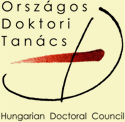|
|
 |
|
| Data sheet of PhD student |
 Print preview Print preview| Publications |
2020
 from data base, 2020. VIII. 24. |
Korcsok Beáta, Faragó Tamás, Ferdinandy Bence, Miklósi Ádám, Korondi Péter, Gácsi Márta: Artificial sounds following biological rules: A novel approach for non-verbal communication in HRI, SCIENTIFIC REPORTS 10: (1) pp. 1-13.
type of document: Journal paper/Article
language: English
URL |
2019
 from data base, 2020. VIII. 24. |
Nagy Balázs, Korcsok Beáta, Nánási József, Niitsuma Mihoko: EthoCar, Human-Dog Interaction Inspired Human-Autonomous Car Communication, CAX TECHNOLOGIES JOURNAL 2019: (7) pp. 5-12.
type of document: Journal paper/Article
language: English
|
2018
 from data base, 2020. VIII. 24. |
Konok V, Korcsok B, Miklósi Á, Gácsi M: Should we love robots? – The most liked qualities of companion dogs and how they can be implemented in social robots, COMPUTERS IN HUMAN BEHAVIOR 80: pp. 132-142.
type of document: Journal paper/Article
number of independent citations: 15
language: English
URL |
2018
 from data base, 2020. VIII. 24. |
Korcsok Beáta, Konok Veronika, Persa György, Faragó Tamás, Niitsuma Mihoko, Miklósi Ádám, Korondi Péter, Baranyi Péter, Gácsi Márta: Biologically Inspired Emotional Expressions for Artificial Agents, FRONTIERS IN PSYCHOLOGY 9: 1191
type of document: Journal paper/Article
number of independent citations: 1
language: English
URL |
2018
 from data base, 2020. VIII. 24. |
Abdai Judit, Korcsok Beáta, Korondi Péter, Miklósi Ádám: Methodological challenges of the use of robots in ethological research, Animal Behavior And Cognition 5: (4) pp. 326-340.
type of document: Journal paper/Review paper
number of independent citations: 4
language: English
URL |
2015
 from data base, 2020. VIII. 24. |
Korondi Péter, Korcsok Beáta, Kovács Szilveszter, Niitsuma Mihoko: Etho-robotics: What kind of behaviour can we learn from the animals?, IFAC PAPERSONLINE 48: (19) pp. 244-255.
type of document: Journal paper/Article
number of independent citations: 9
language: English
URL |
2015
 from data base, 2020. VIII. 24. |
Dr. Fekete Róbert Tamás, Korcsok Beáta, Raj Levente: Affective psychological basis of behavioural modelling and simulation in ethorobotics, In: Korondi, Péter (szerk.) CERiS'15, (2015) pp. 30-39.
type of document: Conference paper/Előadás vagy poszter cikke
number of independent citations: 2
language: Hungarian
|
2014
 from data base, 2020. VIII. 24. |
Faragó Tamás, Miklósi Ádám, Korcsok Beáta, Száraz Judit, Gácsi Márta: Social behaviours in dog-owner interactions can serve as a model for designing social robots, INTERACTION STUDIES 15: (2) pp. 143-172.
type of document: Journal paper/Article
number of independent citations: 5
language: English
URL |
2014
 from data base, 2020. VIII. 24. |
Faragó Tamás, Gácsi Márta, Korcsok Beáta, Miklósi Ádám: Why is a dog-behaviour-inspired social robot not a doggy-robot?, INTERACTION STUDIES 15: (2) pp. 224-232.
type of document: Journal paper/Article
language: English
URL |
2014
 from data base, 2020. VIII. 24. |
Korcsok Beáta, Korondi Péter, Miklósi Ádám: Az etológia szerepe a szociális robotok fejlesztésében, In: Korondi, Péter (szerk.) Proceedings of ARES’14, BUTE (2014) pp. 66-70.
type of document: Part of book/Proceedings Paper
language: Hungarian
|
| | Number of independent citations to these publications: | 36  |
|
|
|
|
|
|
|
|

 Login
Login Forum
Forum